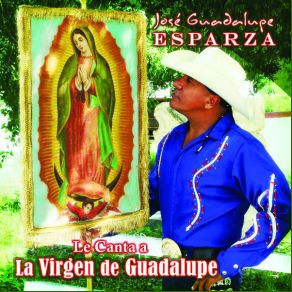Le Canta a la Virgen de Guadalupe
Download links and information about Le Canta a la Virgen de Guadalupe by José Guadalupe Esparza / Jose Guadalupe Esparza. This album was released in 2007 and it belongs to Latin genres. It contains 10 tracks with total duration of 33:37 minutes.

|
|
|---|---|
| Artist: | José Guadalupe Esparza / Jose Guadalupe Esparza |
| Release date: | 2007 |
| Genre: | Latin |
| Tracks: | 10 |
| Duration: | 33:37 |
| Buy it NOW at: | |
| Buy on iTunes $9.99 | |
Tracks
[Edit]| No. | Title | Length |
|---|---|---|
| 1. | Serenata del Alma | 3:30 |
| 2. | Mi Lupita | 3:11 |
| 3. | Mi Novia Morena | 3:06 |
| 4. | Virgencita de Guadalupe | 3:27 |
| 5. | Buenos Días Paloma Blanca | 2:49 |
| 6. | Ayúdanos Virgencita | 2:56 |
| 7. | Morena de Mis Amores | 3:47 |
| 8. | Te Cantamos Con Amor | 3:05 |
| 9. | El Amor Eres Tú | 3:02 |
| 10. | Pescador de Hombres AKA el Pescador | 4:44 |
Details
[Edit]Someone who doesn't speak Spanish might hear this regional Mexican release and assume that José Guadalupe Esparza is addressing typical ranchera themes — things like a vaquero (Mexican cowboy) losing the love of his life and drowning his sorrows in tequila, or a bullfighter who fears loneliness and heartbreak more than he fears an angry bull. Musically, Le Canta a la Virgen de Guadalupe sounds like a typical secular ranchera album would sound. But in fact, this 34-minute CD addresses religious subject matter — specifically, subject matter that Mexican Catholics are familiar with. The English translation of this album's title is Sings to the Virgin of Guadalupe; in Mexico, the Virgin of Guadalupe (also known as Our Lady of Guadalupe in English or Nuestra Señora de Guadalupe in Spanish) is a 16th century icon that depicts an apparition of the Virgin Mary. So even though this might sound like a secular ranchera album to non-Spanish-speaking ears, those who do speak español and understand the lyrics will quickly realize that Esparza is dealing with some very Catholic themes. Some of the songs employ mariachi instrumentation, while others favor accordion-powered norteño instrumentation. But either way, every song pays tribute to Mexico's Virgin of Guadalupe in some fashion. Esparza, it should be noted, is primarily a secular artist; he is much better known for romantic themes (both as a Bronco member and as a solo artist) than for religious themes, and this 2007 release is definitely a departure for him. It also is appealing regardless of whether or not one is Catholic; just as many non-Rastafarians enjoy reggae, and one doesn't have to be Catholic to appreciate the passion that Esparza brings to this nicely crafted CD.